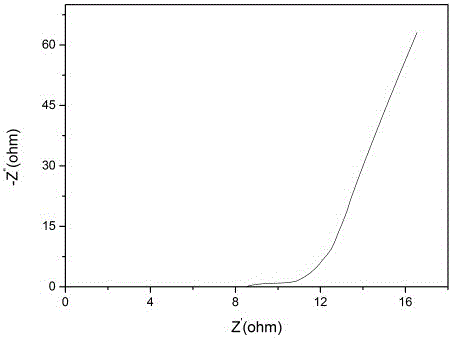CoTe nanometer material applied to supercapacitor electrode and preparation method thereof
A technology of supercapacitors and nanomaterials, applied in the field of nanomaterials, can solve the problems of environmental pollution restrictions, low reserves, poor conductivity, etc.
- Summary
- Abstract
- Description
- Claims
- Application Information
AI Technical Summary
Problems solved by technology
Method used
Image
Examples
Embodiment 1
[0026] 1) Put 0.3mmol Te, 0.3mmol CoCl 2 Dissolve in 24mL KOH solution with a concentration of 6M, add 6mL hydrazine hydrate, and stir at room temperature for a reaction time of 4 hours;
[0027] 2) Transfer the mixture to a 50mL polytetrafluoroethylene hydrothermal kettle, seal it, and react in a furnace at 200 degrees Celsius for 4 hours;
[0028] 3) After the reaction, the reactor was cooled with the furnace, and the black precipitate was collected by suction filtration, and washed with deionized water several times; the precipitate was baked at 70°C for 12 hours, and the obtained dry CoTe powder was used for the preparation of electrodes and test.
Embodiment 2
[0030] 1) Put 0.3mmol Te, 0.3mmol CoCl 2 Dissolve in 24mL KOH solution with a concentration of 6M, add 6mL hydrazine hydrate, and stir at room temperature for 3 hours;
[0031] 2) Transfer the mixture to a 50mL polytetrafluoroethylene hydrothermal kettle, seal it, and react in a furnace at 200 degrees Celsius for 4 hours;
[0032] 3) After the reaction, the reactor was cooled with the furnace, and the black precipitate was collected by suction filtration, and washed with deionized water several times; the precipitate was baked at 70°C for 12 hours, and the obtained dry CoTe powder was used for the preparation of electrodes and test.
Embodiment 3
[0034] 1) Put 0.3mmol Te, 0.3mmol CoCl 2 Dissolve in 24mL KOH solution with a concentration of 6M, add 6mL hydrazine hydrate, and stir at room temperature for 2 hours;
[0035] 2) Transfer the mixture to a 50mL polytetrafluoroethylene hydrothermal kettle, seal it, and react in a furnace at 200 degrees Celsius for 4 hours;
[0036] 3) After the reaction, the reactor was cooled with the furnace, and the black precipitate was collected by suction filtration, and washed with deionized water several times; the precipitate was baked at 70°C for 12 hours, and the obtained dry CoTe powder was used for the preparation of electrodes and test.
PUM
| Property | Measurement | Unit |
|---|---|---|
| Diameter | aaaaa | aaaaa |
Abstract
Description
Claims
Application Information
 Login to View More
Login to View More - Generate Ideas
- Intellectual Property
- Life Sciences
- Materials
- Tech Scout
- Unparalleled Data Quality
- Higher Quality Content
- 60% Fewer Hallucinations
Browse by: Latest US Patents, China's latest patents, Technical Efficacy Thesaurus, Application Domain, Technology Topic, Popular Technical Reports.
© 2025 PatSnap. All rights reserved.Legal|Privacy policy|Modern Slavery Act Transparency Statement|Sitemap|About US| Contact US: help@patsnap.com



